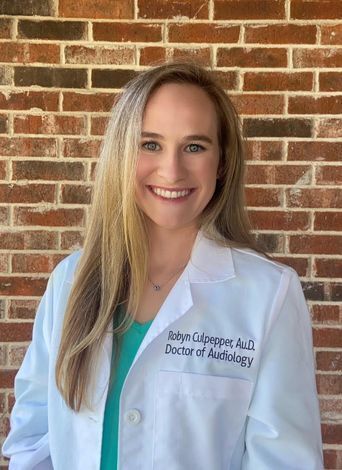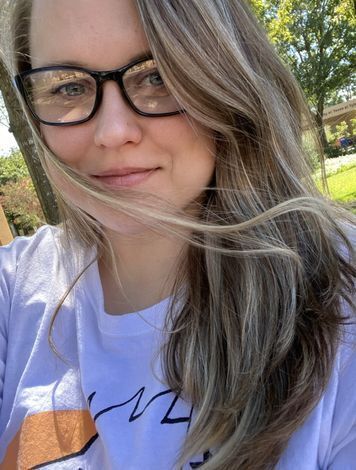USH Ambassadors for Texas - Robyn, Ashlyn and Nilam
Robyn Culpepper

Growing up, I never knew anything was different about myself other than wearing hearing aids. I was lucky to have my hearing loss caught at birth and was amplified by 9 months of age. I grew up playing all kinds of sports such as soccer, softball, gymnastics, basketball, and volleyball. I enjoyed being in percussion from a young age until I finished high school. When I turned 15, I began noticing some difficulty seeing at night, tripping over things on the ground, and struggling while I was batting in softball. We scheduled a visit to my optometrist and a visual field test was performed, revealing retinitis pigmentosa in the early stages. That one visual field began the snowball of my test battery.
Head CTs, MRIs, and genetic testing were ordered. There were some unknowns about my family history, but no one else had been diagnosed with a hearing loss or vision difficulties similar to what I was experiencing. Each test began to come back negative for any results. My senior year of high school, I was finally able to have my genetics fully tested, knowing the results could take up to a year.
Three days after turning 18, we received the phone call with the results of Usher Syndrome type 2A. My world completely shattered and my family was shattered from the news. I was about to go off to college with a heartbreaking diagnosis. I struggled to find myself throughout my undergraduate education, but I leaned hard into my family, friends, and support system. I have been living to the fullest with my diagnosis. I am now married, working toward finishing up my doctoral education to become an audiologist. My diagnosis has led to many irreplaceable friendships in the USH Community that I am beyond lucky to have. I cannot wait to see where the future of Usher Syndrome takes us all!
Contact Robyn at: ambassador.tx2@usher-syndrome.org
Lauren "Ashlyn" Goforth

My name is Lauren Goforth; I go by Ashlyn and I was born and raised in Texas. I have a profound hearing loss, discovered when I was almost 2. American Sign Language is my first language, and I have been using it since my diagnosis.
I began to have night vision issues when I was around 11. My parents noticed that after I had an injury from playing hide and seek at nighttime with my cousins. We were not aware that it was connected to something else. When I was about 13, my ophthalmologist referred us to a specialist and did a retinal eye exam. That was when we were told that I would be blind and that I had Usher syndrome. We got scared, and that was it….My family and I struggled to accept it because there weren't any guidelines or good information about Usher syndrome at that time. My family moved us to another state for me to attend a deaf school in Pennsylvania. I could not embrace my condition then because no one would open up about Usher syndrome. I could not talk about it with my family as well.
I finally embraced it after having my son. My son was born prematurely and fought for his life in NICU. That was when I realized it: Unconditional love. I love my son more than anything, despite his medical needs. If I embrace who he is, I should accept who I am.
I am currently a senior at one of the universities in Texas. I have a Bachelor's in Kinesiology and a minor in Psychology. I am currently pursuing a Master's degree in occupational therapy. I have many passions: to spread information, fight for services and support, and help families go through their journeys better so they aren't misled like we were when we first learned about Usher syndrome. My favorite line is, "We were not born disabled until the world makes us disabled."
Since the beginning of my motherhood, I have become an advocate for children with needs, therapies, parents of children with medical conditions, interpreters, and more.
With Usher syndrome, we can overcome anything and break barriers. Your children can and will do the same thing. That is why I became an USH Ambassador for Texas - to be a role model to those beautiful souls and share my knowledge and experiences with others.
If you seek more resources or help understanding the life of Usher syndrome, don't hesitate to contact me by email at: ambassador.tx@usher-syndrome.org
Nilam Agrawal
Nilam recently joined the team of ambassadors in Texas. She is the mom of two children with Usher syndrome, and an amazing advocate.
You may contact her at ambassador.tx3@usher-syndrome.org
Resources for Texas
-
The USH Trust is the largest international contact database of individuals with Usher syndrome. Created and maintained by the Usher Syndrome Coalition, it is our most powerful tool to connect and inform individuals living with Usher worldwide. The USH Trust allows us to get to know and serve the community better, and to do what we do best: identify, build, support, and connect the community, both within the Usher community and with the research community. We do this via email, telephone, videophone, social media, webinars, local social events, our USH Connections Conference, and the many resources on our website. Come, join us!
-
Individuals with Usher syndrome who are passionate about research have a new data collection platform to join. The Usher Syndrome Data Collection Platform, or USH DCP, is hosted by RARE-X, a nonprofit dedicated to accelerating research. By entering your health information into this secure platform, you will become part of a global database of de-identified information available to researchers worldwide. That means that only you can see your data. Only you can change your data. Your personal information (name, date of birth, address, etc.) will not be shared without your permission. As the DCP grows, more researchers will become aware of Usher syndrome. This can lead to the development of clinical trials, new treatments, and new therapies. YOU hold the key to unlocking future research discoveries.
-
The Texas DeafBlind Project provides technical assistance, information, and training to address the early intervention, special education, related services, and transitional services needs of children with DeafBlindness and enhance state capacity to improve services and outcomes for children and their families.
-
Program and services for youth and adults with combined vision and hearing loss.
-
Provides free telecommunication evaluation, equipment, and training to children and adults with significant vision and hearing loss who qualify. iCanConnect is a national program authorized under the National Deaf-Blind Equipment Distribution Program.
-
USH Ambassador Robyn Culpepper describes her life, career choice, advocacy, grief, dating and marriage, finding a support system, and genetic testing information.
-
A national volunteer organization created to empower the voices of families of individuals who are deaf-blind and to advocate for their unique needs.
-
Relay Conference Captioning (RCC) service enables you to actively participate in conference calls, video meetings and webinars. With RCC, you can read live captions via a web browser on your computer, laptop, tablet or mobile device. You have the option of either speaking or typing to communicate with the other attendees. This service is designed for people who are Deaf, Hard of Hearing, or those with a Speech Disability. There is no cost to use the service for people who live or work in Texas.
Meet the Usher Community in TX
-
Krishangi Shroff lives in TX and has Usher syndrome. At the age of 11, she gave testimony in front of the TX State Board of Education and Texas Education Agency officials during the Texas Dyslexia Handbook revision in June 2021, sharing the need for dyslexia identification in children who are deaf, blind and DeafBlind.
-
Krishangi Shroff, a determined young disability advocate, shares a poignant account of her struggle to exercise her right to read chapter books in elementary school.







